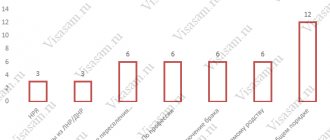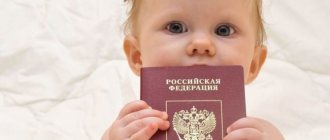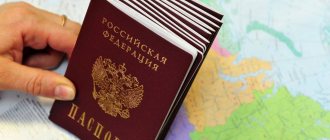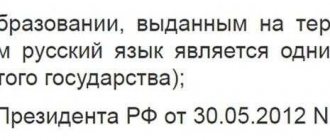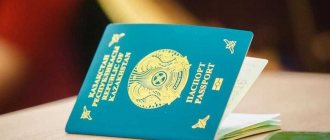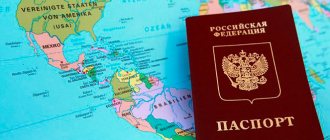Principles of Citizenship
The principles of citizenship of the Russian Federation are fundamental principles that establish the basis of the legal status of citizens of the Russian Federation, as well as regulating issues of the procedure for acquiring and terminating citizenship of the Russian Federation and other issues.
- unity and equality of citizenship of the Russian Federation, regardless of the grounds for its acquisition;
- unified citizenship throughout the Russian Federation;
- the principle of permanent citizenship , meaning the retention of citizenship by persons located outside the Russian Federation;
- the inadmissibility of depriving Russian Federation citizenship of those persons permanently residing outside the Russian Federation;
- the right of every citizen of the Russian Federation to freely choose citizenship ; no one can be deprived of Russian citizenship or the right to change it;
- the inadmissibility of expelling a citizen of the Russian Federation outside the Russian state or transferring him to a foreign state;
- the admissibility of the simultaneous possession of citizenship of a foreign state by a citizen of the Russian Federation in accordance with federal law or an international treaty of the Russian Federation;
- the inadmissibility of restricting the civil rights and freedoms of a citizen of the Russian Federation if he has dual citizenship
- the principle of equality of rights and freedoms of citizens of the Russian Federation , stateless persons and foreign citizens, with the exception of special rights, freedoms and obligations arising from the institution of citizenship of the Russian Federation.
Main advantages
Having become a citizen in Russia, a foreigner will be able to legally get a job in this country, as well as receive pension payments, benefits, and free higher education here. It is much easier and cheaper for a Russian citizen to open a business or take out a loan than for someone who is not a citizen. Citizenship of the Russian Federation gives a person living within the country the opportunity to get rid of many unnecessary actions with documents when performing any bureaucratic operations.
Another positive side of living in Russia is the extremely low income tax. 13% is the third lowest tax rate worldwide. Russian citizenship gives a foreigner the opportunity to obtain political or military asylum in the event of any conflicts with their native state.
Conditions for obtaining Russian citizenship
a) residence in the territory of the Russian Federation for 5 years continuously;
b) compliance with the Constitution and legislation of the Russian Federation;
c) the presence of a legal source of livelihood;
d) speak Russian.
The five-year period of residence in the Russian Federation can be reduced to one year in the case of:
a) the person was born on the territory of the RSFSR and previously had USSR citizenship;
b) married to a citizen of the Russian Federation for at least 3 years;
c) the disabled person has capable children who have reached the age of 18 and have Russian Federation citizenship;
d) the person has high achievements in the field of science, technology and culture; the person has a profession or qualification that is of interest to the Russian Federation;
e) granting a person political asylum on the territory of the Russian Federation;
f) recognition of a person as a refugee.
In a simplified manner (without complying with the condition on the period of residence on the territory of the Russian Federation), citizenship is obtained under the following conditions:
a) have at least one disabled parent - a citizen of the Russian Federation;
b) had citizenship of the USSR, lived and are living in states that were part of the USSR, did not receive citizenship of these states and, as a result, remain stateless persons.
3. Reinstatement of Russian Federation citizenship applies to foreign citizens and stateless persons who previously had Russian Federation citizenship . The mandatory period of continuous residence on the territory of the Russian Federation for such persons is reduced to 3 years.
Option - choice of citizenship when changing state borders.
Transfer t is the transition of a population from one citizenship to another in connection with the transfer of the territory in which it lives from one state to another.
Citizenship in the Russian Federation by birth after 02/06/1992 and before 07/01/2002
During these years, the principles of granting citizenship were regulated by the law of November 28, 1991. After 2002, it lost its relevance, but some articles from it were transferred to the new Federal Law No. 62, which is still in force today. In particular, this is the procedure for naturalization of persons born before 2002.
According to its norms, adult children who were born later than 02/06/1992 and before 07/01/2002 on the territory of the Russian Federation and one or both parents of whom at that time were citizens of the Russian Federation, and then left the country and changed citizenship.
Important: foreigners who received Russian citizenship during the described period and then left the country with their children, who automatically became Russians, continue to remain subjects of the Russian Federation, but only if they have not formally renounced such citizenship.
In such a situation, it is advisable to submit an application to verify Russian citizenship. For those who are in the country, it will be accepted by the Ministry of Internal Affairs. Those who live abroad must submit a request to the consulate or diplomatic mission at their place of residence. The application must be accompanied by all available documents that could confirm the fact of being in Russia after 1992 and before 2002.
Refusal to grant Russian citizenship
a) advocating a violent change in the foundations of the constitutional system of the Russian Federation;
b) deportation from the Russian Federation within 5 years preceding the filing of the application;
c) use of false documents or communication of knowingly false information;
d) military service, service in security agencies or law enforcement agencies of a foreign state;
e) the presence of an unexpunged or outstanding conviction for committing intentional crimes on the territory of the Russian Federation or abroad;
f) criminal prosecution by the competent authorities of the Russian Federation or foreign states for committing a crime;
g) conviction and serving a sentence of imprisonment for actions prosecuted in accordance with federal law;
h) the absence of a legal source of livelihood on the day of applying for citizenship or for 5 years of continuous residence in the territory of the Russian Federation.
4. Other grounds for acquiring citizenship (for example, when both parents acquire Russian citizenship, their children also become citizens of the Russian Federation).
When the State border of the Russian Federation changes, persons living in the territory that became part of the Russian Federation have the right to choose Russian citizenship (option) in the manner and within the time limits established by the relevant international treaty of the Russian Federation.
States that grant citizenship to parents after the birth of a child on their territory
When deciding which country is best to give birth to a child in order to obtain citizenship, it is important to know that there are a number of powers that also grant their citizenship to the parents of the newborn.
In particular, such rules apply in some Latin American countries. For example, if a baby was born in Mexico or Brazil, then his parents, who have been permanently residing in these countries for two years without a break, have the right to receive a passport from one of these countries.
Grounds for termination of citizenship
- Renunciation of citizenship , which can take place at the voluntary request of a citizen of the Russian Federation. Renunciation of citizenship is not allowed if a citizen of the Russian Federation:
a) has an unfulfilled obligation to the Russian Federation established by federal law;
b) has been brought in by the competent authorities of the Russian Federation as a defendant in a criminal case or has a court conviction that has entered into legal force and is subject to execution;
c) has no other citizenship and no guarantees of its acquisition.
2. Other grounds (for example, if the citizenship of the Russian Federation of both parents is terminated, the citizenship of the Russian Federation of their children is terminated, provided that they do not become stateless persons).
When changing the nationality (leaving the Russian Federation) of the territory of permanent residence of a citizen of the Russian Federation, the latter may (in accordance with the terms of an international treaty) choose a different citizenship.
In accordance with the Constitution of the Russian Federation, issues of citizenship of the Russian Federation fall within the competence of the President of the Russian Federation . The Ministries of Foreign and Internal Affairs of the Russian Federation play an important role in making decisions on issues of citizenship.
Countries that grant citizenship by birth on their territory ("right soli")
The 2021 list of countries that grant citizenship to babies born on their soil includes countries in North and South America, the African continent, Europe and Asia.
To open up prospects for free movement around the world, high-class medical care, obtaining an international diploma and a prestigious job for your child, you should know in which countries land rights at birth are relevant and choose the right country of second citizenship.
Former USSR countries
Wanting to preserve their ethnic composition and reduce the massive influx of immigrants, post-Soviet states rarely grant citizenship according to the “right of the soil.”
The Baltic countries, which became sovereign powers after the collapse of the USSR, legislated for obtaining citizenship by “right of blood.” For example, a newborn can become an Estonian citizen if one of his parents is Estonian.
In Latvia, the citizenship of a child is issued provided that the mother or father of the child is Latvian. Only orphans and children found on the territory of the state, about whose parents nothing is known, as well as direct descendants of Latvians - citizens of Latvia as of June 17, 1940, are entitled to obtain citizenship by birth on Latvian soil.
Of all the countries of the former socialist camp, only Romania is ready to grant citizenship to all babies born on its soil.
European states
Some Western European countries are ready to establish legal ties with persons born on their soil. In particular, these are states such as:
- Great Britain;
- Germany;
- Italy;
- France;
- Spain;
- Denmark;
- Belgium;
- Ireland;
- Greece.
When planning a birth in Europe, remember that Western European countries, before recognizing children born on their territory as their citizens, require a number of requirements to be met, after which citizenship is granted.
Countries of America, Africa and Asia
States of North and South America that grant their citizenship to children born on their territory automatically, without the requirement to fulfill additional conditions:
- Antigua and Barbuda;
- Argentina;
- Barbados;
- Belize;
- Bolivia;
- Brazil;
- Costa Rica;
- Dominica;
- Ecuador;
- Salvador;
- Grenada;
- Guatemala;
- Guyana;
- Honduras;
- Jamaica;
- Mexico;
- Dominican Republic;
- Venezuela;
- Grenada;
- Colombia;
- Nicaragua;
- Panama;
- Paraguay;
- Peru;
- Saint Lucia;
- Saint Christopher and Nevis;
- Saint Vincent and the Grenadines;
- Trinidad and Tobago;
- Uruguay;
- Chile;
- USA;
- Canada.
Planning to have a child in the USA is quite popular among Russians.
Asian states practicing "law of the land":
- Fiji;
- Malaysia;
- Pakistan.
The only African country that grants citizenship to children based on their place of birth is Lesotho.
Categories of individuals who have the right to reside in the territory of the Russian Federation
a) citizens of a state - persons who have documentary evidence of their belonging to the citizenship of a given state;
b) foreign citizens - persons who are not citizens of a given state and have citizenship (nationality) of a foreign state;
c) stateless persons (stateless persons) - persons who are not citizens of a given state and do not have proof of citizenship of a foreign state.
Stateless persons are persons without citizenship.
Bipatrids are persons who have dual citizenship.
FAQ
Is Indonesian citizenship given to a child if the birth is planned in Bali?
No. The Indonesian legal system provides for the possibility of obtaining citizenship primarily based on the “principle of blood”. If the father and mother of the baby are Russian, then the baby born in Bali will become a Russian. The child's birth certificate will need to be certified at the Russian Embassy in Jakarta. If the baby's father or mother are citizens of Indonesia, the newborn can become a citizen of this country. Therefore, answering the question regarding whether, if you give birth in another country, what citizenship the child will have, it should be noted that everything depends on the legal system of a particular state.
What documents do I need for my child to return home?
If the parents of a child born abroad are Russian, their baby automatically becomes a citizen of the Russian Federation, regardless of the place of birth. To return home to Russia, your baby does not need a visa - you only need Russian foreign passports of all family members. A second passport, for example, an American one, if the newborn was born in the USA, can be issued at the US Embassy in Moscow upon arrival at home.
The meaning of citizenship
- The emergence of additional rights : to elect and be elected, to participate in referendums, to hold public office, to serve in the armed forces of the Russian Federation.
- The appearance of responsibilities , including paying taxes and performing military service.
Thus , citizenship allows a person to fully enjoy all rights and freedoms in the Russian Federation and bear responsibilities. To be a citizen does not only mean having a document certifying this, but it also presupposes the desire to devote one’s work and abilities to the cause of the prosperity of the Motherland, and to be worthy citizens of one’s country.
Material prepared by: Melnikova Vera Aleksandrovna
Rating of popular countries for the birth of a baby in order to obtain citizenship
The United States of America leads the list of countries most desired by parents to give birth to a child. The disadvantage of an American passport is that its owner is required to pay taxes from the age of 18, regardless of whether the American citizen lives in the United States or not.
Below is a list of countries favorable for having a child and obtaining a second passport:
- Chile is the safest country out of 33 Latin American countries with a low level of corruption. A Chilean passport gives you the right to enter any country in South America, the USA, Canada, Japan and European countries without a visa. The father and mother of a baby born here have the right to reside in the republic. For Russians wishing to visit Chile, a visa is not required;
- Canada is a country with excellent ecology, low crime rates and free, high-quality healthcare. The holder of a Canadian passport is not required to pay taxes to the country if he does not live within its borders. To come to give birth in Canada, Russians will need to obtain a visa;
- Brazil - grants citizenship to a baby for the fact of birth on its soil. After 2 years of residence in the country, the parents of the newborn have the right to become citizens of this state. To go to give birth in Brazil, Russians do not need a visa;
- Argentina - the holder of an Argentine passport has the right to travel without a visa in Europe, the UK and Latin American countries. Citizens of the Russian Federation do not require a visa to enter Argentina.
The benefits that the child and his parents will receive after the baby is born are decisive for which country to give birth in.
Real reviews
Cristina about the citizenship of the child in Chile: “We gave birth to the child in Chile. We received a birth certificate 3 days after giving birth, a week later a Chilean ID and passport, and another 3 days later a Russian one. And we are already in Russia with these documents. We lived there for less than 2 months. We had a great time before the birth and, of course, after with our son! He is now a Chilean citizen."
Elena, whose birth took place in Ottawa (Canada): “A Canadian passport in Ottawa is issued by mail, but at the post office you can pick up an envelope with a passport application form. The passport application form is simple, the only difficulty is that you need a guarantor in Canada - a Canadian who has known you for more than 2 years. We need his full name, passport details and signature. We also need a special sample of 2 photos of the child - we took them in a photo studio for $25 (one also has the signature of the guarantor). The passport costs $54 and usually takes 2 weeks to complete. The husband submitted and collected the passport personally; a child is not required.”
Legislative regulation
Citizenship of the Russian Federation is acquired by birth, as a result of admission or restoration of citizenship of the Russian Federation, as well as in the event of changes in the state borders of Russia in accordance with an international treaty.
The procedure for acquiring Russian citizenship is regulated by the Constitution of the Russian Federation, the federal law “On Citizenship of the Russian Federation” dated May 31, 2002, the decree of the President of the Russian Federation “On approval of the regulation on the procedure for considering issues of citizenship of the Russian Federation” dated November 14, 2002, and the State Program for Assistance to Voluntary Resettlement to the Russian Federation of compatriots living abroad (approved by decree of the head of state of June 22, 2006) and other legislative acts.
The legislation provides for a general and simplified procedure for obtaining Russian citizenship.
Admission procedure
Admission to Russian citizenship can occur in a general or simplified manner. The difference between them is the following characteristics:
- Grounds for obtaining citizenship.
- Conditions for obtaining citizenship.
- Terms for consideration of applications from citizens (from the date of acceptance of the application until the decision to grant citizenship is made).
- The person who makes the decision to grant citizenship: in the general order is the President, in the simplified order – the head of the territorial unit of the Ministry of Internal Affairs.
In the general procedure, the processing time for citizenship is up to 1 year, in the simplified procedure – up to 6 months (in some cases – up to 3 months).
There are no quotas for acquiring Russian citizenship. The legislation does not provide for the acquisition of citizenship on a preferential basis on the basis of national, social, racial, linguistic and religious affiliation.
In Art. 37 62-FZ specifies the day of acquisition of Russian citizenship:
- It's the child's birthday;
- day of adoption of a child;
- the day of taking the oath of a citizen of the Russian Federation.
After the authorized body for citizenship matters accepts the relevant application, citizenship may be terminated.

